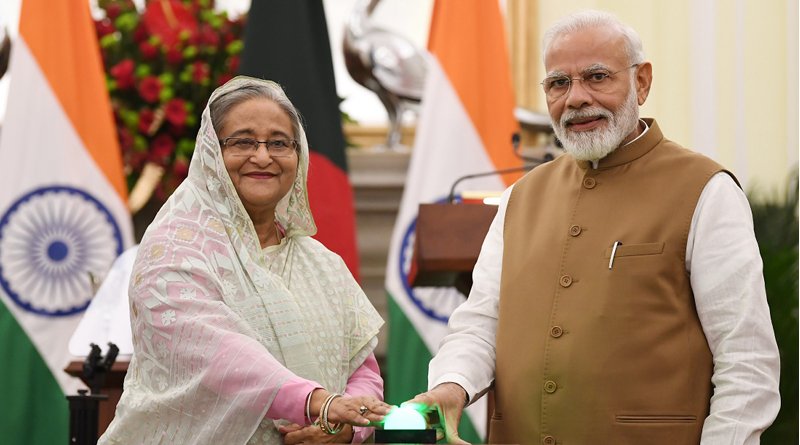Bangladesh PM Urges India To Sign Teesta Water-Sharing Deal
By BenarNews
By Kamran Reza Chowdhury
Bangladesh used a prime minister-level summit with India on Thursday to urge New Delhi once again to sign a long stuck agreement for sharing the waters of the Teesta River, a thorn in bilateral relations for decades.
Prime Minister Sheikh Hasina also told Indian counterpart Narendra Modi that Bangladesh was keen to join a highway project being built by India, Myanmar and Thailand because it would boost commerce and trade, Bangladeshi Foreign Minister A.K. Abdul Momen told a post-summit press conference.
“Prime Minister Sheikh Hasina highlighted the need for the early signing of an interim agreement for the sharing of the Teesta waters, as agreed upon by both the governments in 2011,” said a joint statement issued after the virtual summit – the first meeting between the two leaders since they met in New Delhi in October 2019.
The unresolved issue of the Teesta, which runs through both countries, was also high on the agenda of that Modi-Hasina summit. On the Bangladesh side of the border, the livelihoods of as many as 21 million people depend on the 121-km (75.1-mile) stretch of the Teesta in their country, according to a report by the Asia Foundation.
The Indian government said it was trying “to convince all parties” to agree to a water-sharing deal, Momen told the press conference.
Modi’s and previous governments in India have shown a willingness to reach an accord with Bangladesh on the river.
“Rivers should nurture the India-Bangladesh relationship and not become a source of discord,” Modi had said during his first term as prime minister.
However, the government of West Bengal, which shares a border with Bangladesh, has resisted such a deal, saying it would render parts of the Indian state dry.
Under the Indian constitution, the central government cannot make any decision on water without states’ consent, so while New Delhi and Dhaka came close to a historic agreement in 2011, West Bengal’s government ensured that this didn’t happen.
“Our Prime Minister drew Narendra Modi’s attention about equitable water sharing of common rivers while the Indian side showed their empathy toward [the issue],” Momen said.
People in Bangladesh are frustrated that India still has not agreed to a deal on Teesta, said Syed Munir Khasru, chairman of The Institute for Policy, Advocacy, and Governance, a think-tank.
“Bangladeshis have observed the tug-of-war on the Teesta water-sharing issue between the center and state,” Khasru said in a column on Wednesday in The Hindustan Times, an Indian daily, referring to India’s central government.
“But all that has transpired are empty promises, as rivers run dry and farmers are cut off from their livelihood.”
Even as India has dithered on an agreement, Bangladesh is set to receive a Chinese loan of close to U.S. $1 billion to implement the Teesta River Comprehensive Management and Restoration project to maintain water levels during the drought season.
The Chinese loan marks the first time that the Asian superpower, India’s regional rival, will be involved in a river management project in Bangladesh, as Beijing expands its footprint there through the construction of infrastructure works.
ASEAN-South Asia connectivity
Meanwhile, Bangladesh wants to be part of an India-led road initiative called the India-Myanmar-Thailand Trilateral Highway, which some analysts call New Delhi’s response to Beijing’s One Belt, One Road initiative, or OBOR.
Under OBOR, China’s geopolitical strategy is to build a modern-day Silk Road through a network of ports, railways, roads and trade routes to connect the People’s Republic to markets in Southeast Asia, South Asia and beyond.
The India-led trilateral highway is part of India’s Act East Policy, according to a June 2020 paper by the Economic Research Institute for ASEAN and East Asia, or ERIA. New Delhi is seeking to deepen economic and strategic relations with the Indo-Pacific and Asia-Pacific regions through this doctrine.
The 1,360-km India-Myanmar-Thailand highway is a $140 million project that aims to connect Moreh in India’s eastern Manipur state to Mae Sot in Thailand, via Myanmar, ERIA’s paper said.
During the Modi-Hasina summit on Thursday, Bangladesh’s PM “expressed keen interest” in the three-nation highway project and told India it wanted to be part of it, Momen, Dhaka’s top diplomat, said.
“Our trade and commerce will see a boost if the road is built. We need to be involved in the road belt, considering our strategic interests,” Momen said.
Dhaka should push hard to join the trilateral highway project, said a former Bangladeshi diplomat.
“We should get involved in all connectivity projects such as the India-Myanmar-Thailand highway. If the route passes through Bangladesh, it will benefit all parties,” Munshi Faiz Ahmad, Bangladesh’s ex-ambassador to China, told BenarNews.
‘No lethal weapons will be used’
Meanwhile, the continued fatal shootings of Bangladeshi civilians by India’s Border Security Force (BSF) is a blot on relations between the two countries, and Hasina raised this issue with Modi, Momen said.
As many as 41 Bangladeshis have been killed by India’s border patrol from January to November this year, according to local human rights group Ain-O-Salish Kendra.
As many as 1,185 Bangladeshis were shot dead by the Indian border police between 2000 and 2019, according to Odhikar, a Bangladesh human rights group.
“We have such a good relationship. The border killings stain our relationship,” Bangladesh’s foreign minister said.
Modi assured Hasina that he would instruct personnel not to use deadly weapons, Momen said.

